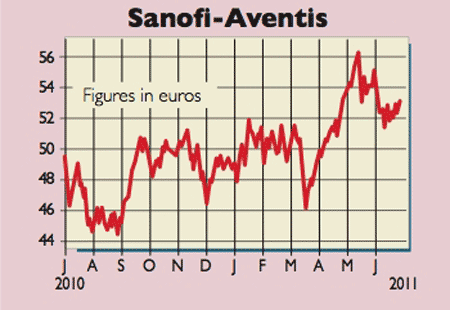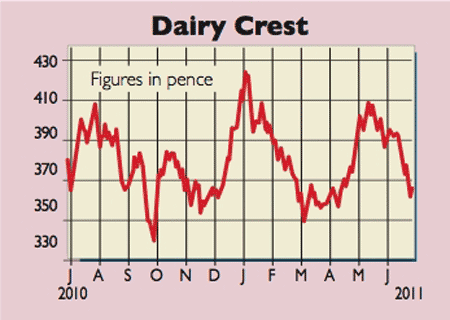Get the latest financial news, insights and expert analysis from our award-winning MoneyWeek team, to help you understand what really matters when it comes to your finances.
You are now subscribed
Your newsletter sign-up was successful
Want to add more newsletters?

Twice daily
MoneyWeek
Get the latest financial news, insights and expert analysis from our award-winning MoneyWeek team, to help you understand what really matters when it comes to your finances.

Four times a week
Look After My Bills
Sign up to our free money-saving newsletter, filled with the latest news and expert advice to help you find the best tips and deals for managing your bills. Start saving today!
1. Sanofi-Aventis (Euronext: SAN), rated OUTPERFORM by Exane BNP Paribas
Most people associate investing in emerging markets with the commodities sector, but healthcare is another strong investment theme. Urbanisation, greater access to hospitals and growing wealth are all driving demand. China's one-child policy has created a demographic time-bomb that will result in a much older population by 2030, with the elderly typically using three to five times more medical services than younger people.

Add it all up and it seems likely that healthcare spending will grow faster than GDP over the next ten years. This is great news for French drug-maker Sanofi-Aventis. It already generates more business in emerging markets than from Europe or America. Chief executive Chris Viehbacher thinks China will become its second-biggest market within five years.
MoneyWeek
Subscribe to MoneyWeek today and get your first six magazine issues absolutely FREE

Sign up to Money Morning
Don't miss the latest investment and personal finances news, market analysis, plus money-saving tips with our free twice-daily newsletter
Don't miss the latest investment and personal finances news, market analysis, plus money-saving tips with our free twice-daily newsletter
To satisfy the demand, the company is building a new plant in Shenzhen for the 2013 flu season. It expects to launch a dengue vaccine in 2014/2015. It also spent $527m buying Chinese outfit BMP Sunstone in October in order to provide a channel to distribute its broad array of prescription drugs, generics, vaccines and animal-health products.
Like most of its peers, Sanofi-Aventis is battling with a series of patent expiries, at which time generic rivals can release their own versions of existing drugs. But the product pipeline is being replenished and now contains 17 promising compounds in late-stage development. This has been helped by the $20bn acquisition of Genzyme in April, which propelled the group into the exciting world of biologics.
The difference between biologics and more traditional medicines is that the former are derived from living organisms rather than chemical substances. There are two key advantages. The risk of harmful side-effects is usually lower, meaning the drug-testing phase tends to be completed quicker. Biologics are also used to prevent rather than simply cure disease. This is becoming very popular as governments look to vaccinate children early on rather than pay the health costs associated with problems in later life.
So Sanofi's troublesome patent cliff has become more of a plateau. Earnings are likely to be flat for the next three years, before growth returns. The City expects 2011 turnover and underlying earnings per share of €33.4bn and €6.70 respectively, putting the stock on a price/earnings (p/e) ratio of eight. It also pays a 4.5% yield. I'd rate the group on a ten-times earnings before interest, tax and amortisation (EBITA) multiple. After deducting net debt of €19bn and a €3.9bn pension deficit, that gives an intrinsic worth of around €70 per share.
What are the risks? As well as integrating Genzyme, Sanofi is exposed to the usual issues of tighter government spending, patent expiries or challenges, pipeline setbacks and tougher regulatory approvals. But with its huge research base and excellent emerging-market weighting, Sanofi looks well placed to benefit from the shift towards ageing populations and improved lifestyles. Second-quarter results are out on 28 July. Exane BNP Paribas has a price target of €66 a share.
Recommendation: BUY at €54.45
2. Dairy Crest (LSE: DCG), rated a BUY by the Royal bank of Scotland
Dairy Crest is Britain's largest dairy foods business, processing and selling fresh milk and branded cheeses, butters and spreads. Its five consumer brands enjoy excellent market positions. Clover is the top dairy spread, County Life the third in butter, Cathedral City the top branded cheese and Frijj the top flavoured milkshake. The group also owns St Hubert, the largest non-butter spread in Italy and number-two player in France.

Dairy Crest delivered revenues and underlying earnings per share of £1.6bn and 46.6p respectively for the year ending March 2011. The brands generated the bulk of the profits, with the rest derived from supermarket own-labels. The long-term goal is to continue promoting its own franchises, and so capitalise on the ongoing trend for fresher and healthier foods. For the moment, the non-branded volume is still important because it contributes to the recovery of overheads.
Dairy Crest is also seeking to maximise its under-exploited milk-distribution business. It is the largest doorstep milkman in the country with around 1.2 million customers and a network of 2,200 delivery staff. The group plans to relaunch its web ordering service, called Milk & More. This top-up grocery service allows families to order online at up to 9pm the day before, with free delivery and no minimum basket size.
Customers (there are approximately 250,000 already) can choose from around 250 everyday items, including milk, fruit juice, bread and locally grown produce, along with bulky items such as bottled water, soft drinks and garden equipment. With no need to book a slot nor sign for the order on arrival, it is a very convenient service.
There are a few dark clouds ahead. Firstly, the board anticipates £65m of rising input costs this year, relating to higher milk, packaging and oil prices. It is hoping to offset all of this margin squeeze against internal savings and inflation-linked price increases.
Secondly, this is a cut-throat sector. The company suffers relentless pressure from aggressive customers, such as Asda, and competitors such as Unilever and Arla, as well as volatile commodity prices. There is also brand risk, particularly in the event of product recalls. For instance, Dairy Crest was forced to withdraw two million tubs of Clover from shops in May 2007 due to fears that the spread was contaminated by mould. On this occasion the insurance footed much of the £5m bill and the impact was short-lived.
Given all this, I would value the group on a ten-times EBITA multiple. After adjusting for the £60m pension deficit and net debt of £312m, this gives an intrinsic worth of about 490p a share. With a stable of top-notch brands, together with a healthy 5% dividend yield, I believe that Dairy Crest offers good value for the more cautious investor. RBS has a 460p price target, and the next trading update is scheduled for 19 July.
Recommendation: LONG-TERM BUY at 370p
Paul Hill also writes a weekly share-tipping newsletter, Precision Guided Investments. See www.moneyweek.com/PGI , or phone 020-7633 3634 for more.
Get the latest financial news, insights and expert analysis from our award-winning MoneyWeek team, to help you understand what really matters when it comes to your finances.
Paul gained a degree in electrical engineering and went on to qualify as a chartered management accountant. He has extensive corporate finance and investment experience and is a member of the Securities Institute.
Over the past 16 years Paul has held top-level financial management and M&A roles for blue-chip companies such as O2, GKN and Unilever. He is now director of his own capital investment and consultancy firm, PMH Capital Limited.
Paul is an expert at analysing companies in new, fast-growing markets, and is an extremely shrewd stock-picker.
-
 Should you buy an active ETF?
Should you buy an active ETF?ETFs are often mischaracterised as passive products, but they can be a convenient way to add active management to your portfolio
-
 Power up your pension before 5 April – easy ways to save before the tax year end
Power up your pension before 5 April – easy ways to save before the tax year endWith the end of the tax year looming, pension savers currently have a window to review and maximise what’s going into their retirement funds – we look at how